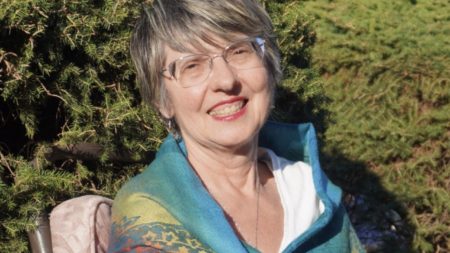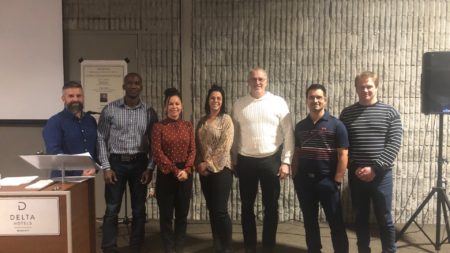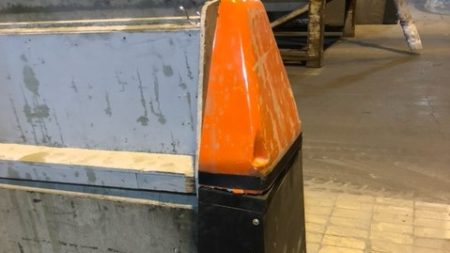Monique Authier: Internationally Renowned Chemist

At the beginning of the 1980s, Monique Authier, a chemist by training, dreamed of settling in the Saguenay–Lac-Saint-Jean region, where she and her husband, Jean-Pierre Martin, could combine their professional ambitions with their love of nature. At the time, she wanted to “test the waters of the industrial field.” In the end, she enjoyed a successful scientific career for 25 years.
An international expert in bauxite chemistry, Authier has had a remarkable career. She holds a PhD in chemistry on the crystallography of single-crystal complexes of DNA bases with mercury and has completed post-doctoral training in physical chemistry on the fluorescence of doped single crystals. She also worked in Vaudreuil laboratories, at the Alcan R&D Centre in Kingston, Ontario, and at the Arvida Research and Development Centre (ARDC).
At the end of her career, in 2007, Authier was serving as director of the Bauxite and Alumina R&D group on the management committee of the ARDC, a position she held for eight years.
“The industrial sector has allowed me to take on many challenges and given me the opportunity to push myself,” she says. “On many occasions, I have had the chance to step out of my comfort zone as a chemist.”
Authier’s expertise has spread across the globe, as she has had the opportunity to present some of her work to the scientific community around the world, an achievement that she is better able to appreciate today.
“At work, I was expected to be an expert in my field. Writing and publishing scientific papers and attending conferences was a normal part of the job. Looking back, I realise that I have had a successful scientific career, and I can be proud of it.”
In the 1990s, Authier was one of the few women scientists working in a traditionally male-dominated field. She remembers that the notion of performance was pervasive for the entire workforce around her, but the pressure was greater for women in this non-traditional environment, with little or no room for error, even in training.
“In those days, there were few women in fields such as science,” she notes. “The challenge was doubled when I found myself on the world stage, where it was even more rare to be French-speaking and a woman.”
Over the course of her career, Authier has shown great versatility in navigating her way through the various positions that she has held, advocating consultation and listening to others.
“Maintaining good interpersonal relationships—with clients, colleagues and staff—was key for me,” she says. “I worked with people from different backgrounds, many of them engineers, and that influenced the way we approached problems. In the industrial field, it’s important to build a network of contacts. You can’t know everything, and as problems recur cyclically over the years, I myself have become part of the next generation’s network.”
Combining science and philanthropy
Throughout her career, Authier has had the opportunity to meet students who were interested in science, both directly and indirectly. She was sometimes surprised by the ambivalence of students, especially obviously bright female students, about pursuing this fascinating field of study.
“Many students who were doing very well in science told me that science and technology was too difficult. One of the things that my husband and I really wanted to do was provide financial support for students so that they could focus on their studies and graduate quickly.”
In 2012, as a tribute to her late husband, himself a former ARDC employee and the first director of the National Research Council’s Aluminium Technology Centre, Authier created the Fonds Jean-Pierre-Martin at UQAC, a science and engineering fund that provides two annual scholarships for students in precarious financial situations.
Three years later, she and her former colleague Sébastien Fortin created the Bourse André-Beauchamp at Université de Montréal, a chemistry scholarship fund in recognition of the teaching excellence of Professor Emeritus André Beauchamp, who was Authier and Fortin’s thesis advisor. Then, in 2021, the Bourse Monique Authier was created at Université de Montréal. Each year, this chemistry fund awards a scholarship to a student in need.
It goes without saying that Monique Authier has left her mark on the ARDC and on bauxite chemistry, her chosen field. Today, Authier leaves behind three scholarship funds, combining science and philanthropy to provide long-term support for the next generation of scientists and encourage students to persevere.
-30-


